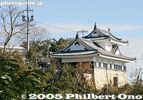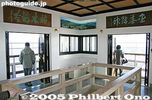|
|

Gifu Castle on Mt. Kinkazan as seen from the Nagara River. In the foreground is Nagaragawa Onsen Spa. Commanding a strategic viewpoint of the entire city, Mt. Kinkazan must have looked like an obvious place to build a castle.
|
|

Gifu Castle on Mt. Kinkazan as seen from the Tokaido Line train. The castle can still be seen from many kilometers away. It is one of the symbols of Gifu city.
|
|

Gifu Castle on Mt. Kinkazan and ropewayA convenient ropeway makes it a snap to visit the castle.
|
|

Gifu Castle ropeway boarding area
|
|

Tenka Daiichi-no-mon GateThe first gate toward the castle tower.
|
|

Former horseback riding grounds
|
|

Remains of the Ninomaru-mon Gate
|
|

Path to the castle towerGo up the left steps to proceed to the tower.
|
|

Gifu Castle towerGifu Castle was originally called Inabayama Castle. Its known history starts from the 16th century with Lord Saito Dosan. Oda Nodunaga later took over the castle in 1567. He also renamed Inaba city as "Gifu."
Nobunaga left Gifu Castle and moved to Azuchi Castle in Shiga Pref. His sons took over Gifu Castle. Right before the Battle of Sekigahara, Tokygawa Ieyasu's forces attacked Gifu Castle which burned to the ground on Aug. 23, 1600.
The current castle tower was reconstructed in 1954.
|
|

Gifu Castle Museum
|
|

Path to Gifu Castle tower
|
|

Castle tower
|
|

Low-angle view of castle tower
|
|

Castle tower base
|
|

Castle clock
|
|

Inside the castle towerIt is a museum inside the tower.
|
|

Castle tower observation deckMarvelous views of Gifu city can be had.
|
|
|

Top floor of castle tower
|
|

Inside Gifu Castle Museum
|
|

Gifu Castle MuseumIt is located on the site of a storehouse.
|
|

Another observation deck
|
|

Ropeway station
|
|
|
|
|